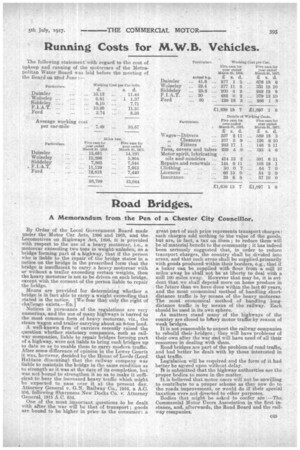Road Bridges.
Page 13

If you've noticed an error in this article please click here to report it so we can fix it.
A Memorandum from the Pen of a Chester City Councillor.
By Order of the Local Government Board made under the Motor Car Acts, 1896 and 1903, and the Locomotives on Highways Act, 1896, it is 'provided with respect to the use of a heavy motorcar, i.e., a motorcar exceeding two tons in weight unladen, on a bridge forming part of a highway, that if the person. who is liable to the repair of the bridge states in a notice on the bridge in the prescribed form that the bridge is insufficient to carry, a heavy motorcar with or without a trailer exceeding certain weights' then. the heavy motorcar is not to be driven on such bridge, except with the consent of the person liable to repair the bridge.
Means are provided for determining whether a bridge is in fact able to carry a weight exceeding that stated in the notice. [We fear that only the right of challenge exists.—En.] Notices in pursuance of the regulations are very numerous, and the use of many highways is barred to the most common form of heavy motorcar, viz., the steam wagon and trailer carrying about an 8-ton load.
A well-known firm of carriers recently raised the .question whether statutory companies, such as railway companies, liable to repair bridges forming part of a highway, were not liable to bring such bridges up to date so as to enable them to carry modern traffic. After some difference of opinion in the Lower Courts it was, however, decided by the House of Lords (Lord Haldane dissenting) that the railway company was liable to maintain the bridge in the same condition as to strength as it was at the date of its completion, but was not bound to strengthen it so as to make it sufficient to bear the increased heavy traffic which might be expected to pass over it at the present day. Attorney General v. G.N. Railway Co., 1916, a A.C. 356, following Sharpness New Docks Co. v. Attorney General, 1915 A.C. 654.
One of the most important questions :to be dealt with after the war will be that of transport ; goods are bound to be higher in price to the consumer: a
great part of such price represents transport charges : such charges add nothing to the value of the goods,
but are, in fact, a tax on them ; to -reduce them will be of material benefit to the community • it has indeed been seriously suggested that, in order to reduce transport charges, the country shall be divided into areas, and that such areas shall be supplied.primarily with goods produced within their borders, e.g., that if a baker can be supplied with flour from a mill 10 miles away he shall not be at liberty to deal with a mill 100 miles away. However that may be, it is evident that we shall depend more on home produce in the future than we have done within the last 60 years, and the most economical method of handling shortdistance traffic is by means of the heavy motorcar. The most economical method of handling longdistance traffic is by means of the railway. Each should be used in its own sphere. As matters stand many of the highways of the country are closed to hgavy motor traffie by reason of weak bridges.
It is not reasonable to expect the railway companies to rebuild their bridges ; they will have problems of their own after the war and will have need of all their resources in dealing with them.
Road bridges are part of the problem of road traffic, and had better be dealt with by those interested in that traffic,.
Legislation will be required and the form of it had better be agreed upon without delay.
rt is submitted that the highway authorities are the proper bodies to move in the matter.
It is believed that motor users will not be unwilling to contribute to a proper scheme as they now do to the roads improvement, or would do if their special taxation were not diverted to other purposes. Bodies that might be asked to confer are :—The Commercial Motor 'Users Association in the first instance, and, afterwards, the Road Board and the railway companies.






















